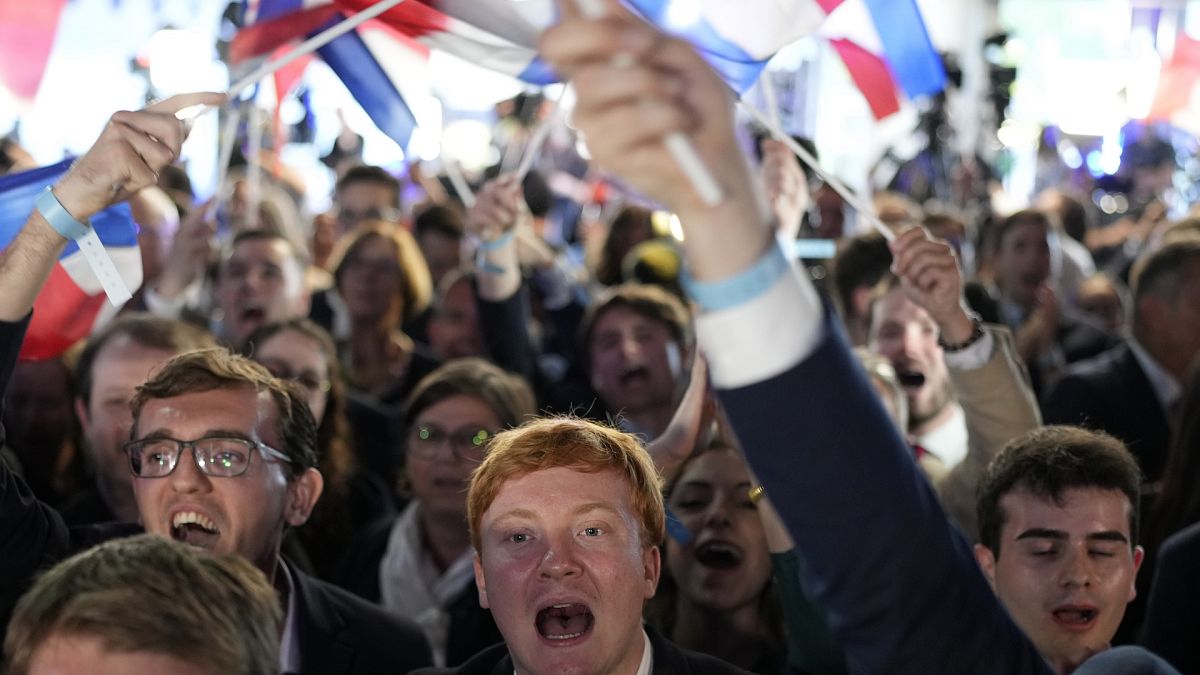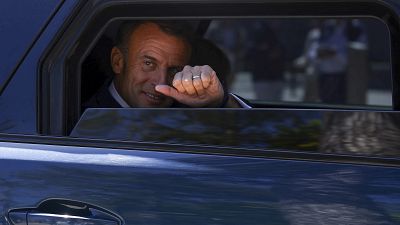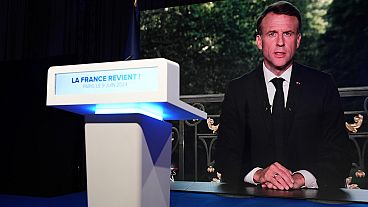“Their program is complete madness,” Le Maire said on Franceinfo radio. “It will guarantee downgrade, mass unemployment and an exit from the European Union.”
EU to Slam France on Budget Deficit, Adding to Macron’s Woes
(Bloomberg) -- The European Union is set to admonish France for breaking the bloc’s deficit and debt rules, triggering a process that can lead to onerous fines and complicating campaign priorities less than two weeks before voting starts in legislative elections.
Most Read from Bloomberg
What to Know About the Deadly Flesh-Eating Bacteria Spreading in Japan
‘I Live in Hell’: Anti-Growth Fervor Grips US South After Pandemic Boom
Nvidia’s 591,078% Rally to Most Valuable Stock Came in Waves
Nvidia Becomes World’s Most Valuable Company as AI Rally Steams Ahead
“Financial markets would be the limits to what the National Rally plans to do,” Famke Krumbmüller, EMEIA leader of geostrategy at EY, said Tuesday. “Whoever will be in power will be constrained by how the financial markets react to their program.”
France isn’t alone in making the so-called excessive deficit procedure list due to be announced Wednesday. A person familiar with the matter told Bloomberg on Tuesday that it will also include Italy and another five countries. Still, Spain and three others who breached the 3% limit escaped.
- The left-wing New Popular Front, which includes Socialists, Communists, Greens and the far-left France Unbowed, is expected to get 26.3%.
- That puts Macron’s Renaissance party and its allies in third place.
“We’re opposing the austerity budget proposed by the EU,” Communist Party head Fabien Roussel told Franceinfo radio on Wednesday. “We’re refusing these rules.”
He said the New Popular Front plans additional spending on healthcare, security, justice and other needs, as well as increased taxes on the most wealthy.
Valerie Rabault, a Socialist candidate and former budget recorder, told Les Echos newspaper she estimates the New Popular Front’s program would lead to new spending of €106 billion ($114 billion) through 2027, a move that would further exacerbate France’s excessive deficit.
An all-out dispute with Brussels would have disquieting parallels with the euro-zone debt crisis, when the currency was brought to the brink as investors panicked over standoffs between EU institutions and heavily indebted governments.
Since then, the EU has bolstered its crisis-fighting toolkit, with the European Stability Mechanism bailout fund and the European Central Bank formalizing conditions under which it could step in to calm markets with bond buying. Still, the central bank would only activate such asset purchases for countries with “sound and sustainable fiscal and macroeconomic policies.”
Speaking on the eve of the EU’s decision, Bank of France Governor Francois Villeroy de Galhau repeated his call to avoid deepening budget deficits.
Respecting our fellow citizens “means recognizing the demands of reality, and not increasing even further heavy deficits that we cannot finance well,” he said.
Le Pen, who once campaigned to pull France out of the euro, has not yet detailed her program.
Meanwhile, the parties in the New Popular Front have united around an election manifesto that includes freezing prices of essential consumer goods, raising the minimum wage, and rejecting the austerity constraints of the EU fiscal rules.
Even so, once in power the parties would likely have to tone down their rhetoric and avoid policies that would worsen relations with the EU, in a manner similar to Italy’s anti-migration prime minister, Giorgia Meloni, Krumbmüller said.
France was already facing difficulties controlling its budget deficit after tax receipts disappointed.
- Before Macron called the election, his government was working on emergency spending cuts of around €20 billion this year and more than that again in 2025.
The country’s debt, also according to the government’s long-term plans, will peak at 113.1% of GDP next year before declining to 112% in 2027.
Last month, S&P Global Ratings downgraded France, highlighting missed goals in the government’s deficit-reduction plans. After Macron called snap elections, Moody’s said the potential political instability is a credit risk and could affect efforts to trim the deficit.
French political risks shake European markets: Analysts react

European stock markets opened cautiously after last week's sell-off. Analysts continue to highlight French political risks as major source of risks heading into snap elections in less than two weeks.
European stock markets opened the week with caution, following a significant sell-off last week driven by rising political risks in France. The French CAC 40 index showed timed gains of 0.2% by 11:00 CET on Monday, following a 6.2% drop the previous week, marking its worst weekly decline since the Russian invasion of Ukraine in February 2022 and wiping out its gains for 2024.
The banking sector was significantly affected, with Societe Generale and BNP Paribas dropping by 14.5% and 12.2%, respectively, last week. These declines triggered a ripple effect, causing the Euro Stoxx Banks index to fall by over 8%. However, on Monday, the banking sector benchmark attempted to rebound by rising 0.4%.
The political crisis in France, sparked by the unexpected results of the weekend's European elections, is heavily weighing on European markets and causing a widening of yield spreads between government bonds within the eurozone. Although the yield on 10-year French OATs remained stable at 3.15%, its spread versus German Bunds closed the week at over 75 basis points, the highest level since July 2017 when the potential risk of a 'Frexit' was priced in due to Marine Le Pen's election prospects.
Over the weekend, five European Central Bank (ECB) officials told Reuters there are no plans for emergency purchases of French bonds amid the political unrest in Paris, emphasising that it is up to French politicians to calm the markets through prudent economic policies.
A recent poll by Ifop for Le Journal du Dimanche, dated 15 June, indicates Marine Le Pen's National Rally party leads with 35% support, followed by the left-wing coalition of the New Popular Front at 29%, which has strong backing among 18-24 year olds. This scenario suggests a shift towards extreme parties compared to centrist and market-friendly parties, with President Emmanuel Macron's Together coalition currently third with 19% support.
On Monday, Citi's global equity strategists downgraded European equities to 'neutral' from 'overweight', citing increased political risks following France's decision to call a snap parliamentary election.
Goldman Sachs equity analyst Lilia Peytavin commented that if the far-right party's 2022 programme were implemented, market reactions could be severe. However, she also suggested that the measures might be more business-friendly than expected, as the far-right will aim to secure the 2027 presidential election, potentially surprising markets positively.
Peytavin noted that the elections of Donald Trump in the US and Giorgia Meloni in Italy had elicited unexpectedly positive market reactions compared to pre-election expectations.
Goldman Sachs added that French international stocks, such as Remy Cointreau, L'Oreal, LVMH, Dassault Systemes, Sodexo, Michelin, Pernod Ricard, EssilorLuxotica, and Publicis, would likely be the least affected.
"At the EU level, despite the outgoing majority maintaining control, the focus of the next legislature will shift from the green and digital transition to more industrial and political themes. We can anticipate a move from a liberal approach to more interventionist public involvement in the economy," wrote Intesa Sanpaolo analysts Pasquale Lodato and Luca Cigognini.








No comments:
Post a Comment